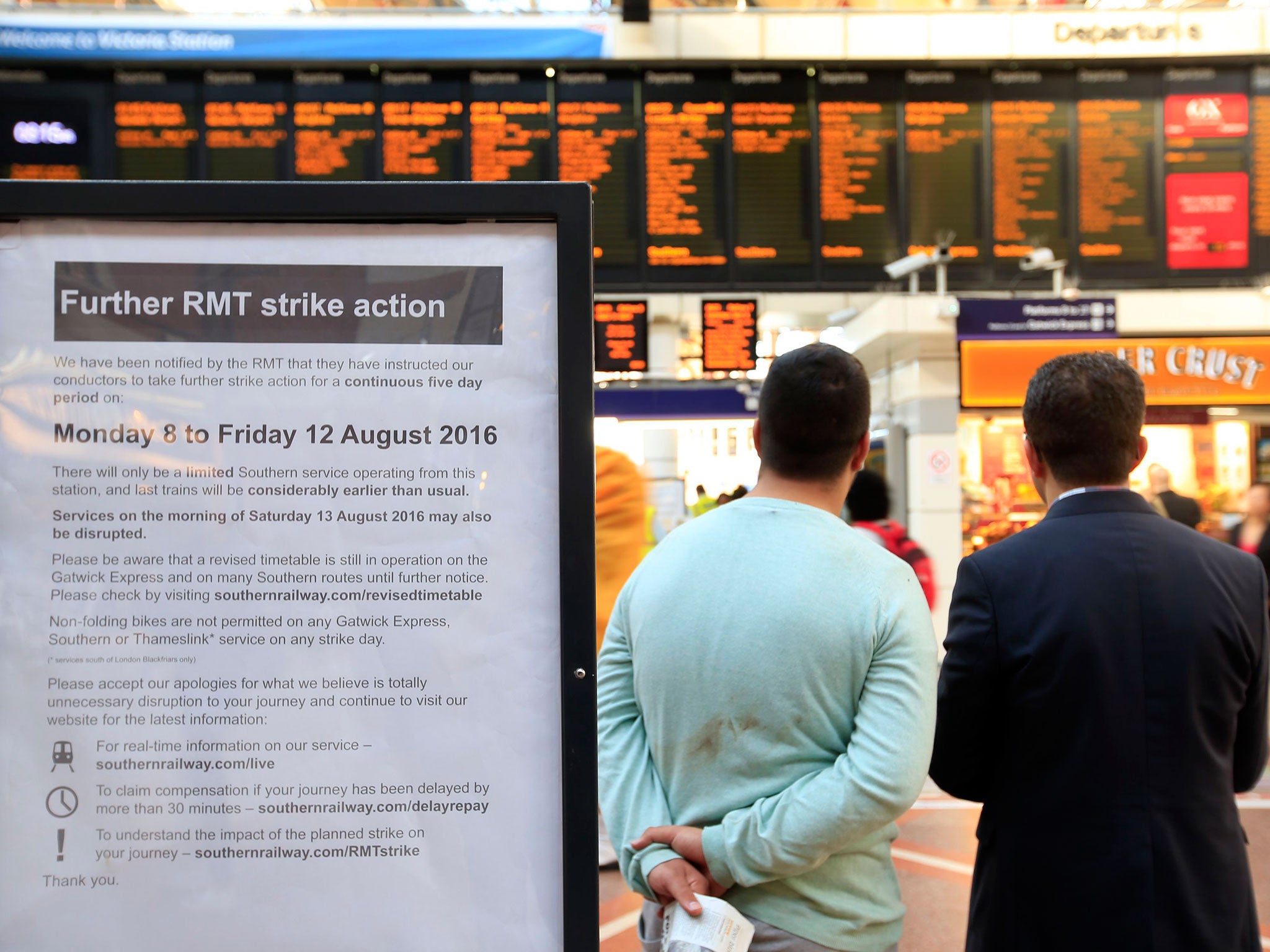Southern rail strike: How the Home Counties became the frontline for a industrial fight to the finish
Longest rail strike in 50 years begins on network serving the Surrey and Sussex commuter belt

The battleground for the most political industrial dispute since the miners’ strike comprises some of the leafiest and richest parts of Britain.
Ever since the Southern Railway was electrified in the 1930s, Surrey and Sussex have been perfect commuter territory. From towns such as Redhill, Lewes and Eastbourne, the train lines into London Victoria and London Bridge have offered swift and usually reliable transport to the capital. As a result, property prices have soared. A four-bedroom semi-detached in Redhill is currently on the market for £725,000.
On a normal day, Redhill can be less than half-an-hour from London - making the journey time shorter than from many outlying Tube stations. But the bitter dispute between Southern and the RMT union has caused frequent cancellations, with journey times on overcrowded trains typically twice as long as usual.
During the current five-day strike aimed squarely at wrecking the travel plans of commuters, the train operator says: “Trains on these routes are likely to be extremely busy and Southern cannot guarantee you space to travel”.
At least Redhill commuters stand some chance of getting to work and back; the next station down the line, Earlswood, will see no trains until Saturday at the earliest.
The middle classes of Surrey and Sussex find themselves caught between two intransigent foes in a battle that has echoes of the 1980s. A row that is ostensibly over whether the train driver or guard should open and close the doors on a fleet of expensive new trains has triggered the longest industrial action from transport unions in half a century.
Barely had the 300,000 passengers who use the Southern network each day adjusted to an emergency timetable cutting hundreds of trains from the daily schedules, than a further two out of five departures were cut because of the strike.
Now estate agents are warning that house prices could be hit if the dispute drags on. Luke Brightman, negotiator for the James Dean estate agency in Redhill, said: “If it goes on longer that will definitely affect the market.”
The picture is similar in Lewes, a historic town normally 70 minutes from Victoria. James Cooper, senior negotiator for Rowland Gorringe, said: “One of the biggest reasons people move to Lewes is the train line.
“If there are ongoing issues [in the dispute], there is every chance it may start affecting life.”

Will Harrington, consultant for Town Property in Eastbourne said the housing market is tougher in any event because of Brexit, and that the rail dispute “could be a contributing factor”.
Most of the areas affected are staunchly middle class, Conservative constituencies. Chris Philp, Tory MP for Croydon south, said: “Southern Rail has been one of the biggest problems facing our neighbourhood for some time now. The constant delays, overcrowding and cancelled trains have blighted commuters and leisure travellers for two years now.” He has joined the London Mayor, Sadiq Khan, in calling for Southern’s parent, Govia Thameslink Railway (GTR), to be stripped of its franchise.
Their voices are unlikely to be heard. It is difficult to imagine that any serious organisation would want to take over the franchise in its present state, and the Government certainly does not want to take back control and be held directly responsible for the collapse in much of the commuter service south of London.
Just as the Thatcher government was content for the National Coal Board to take on the National Union of Miners, so the present Government is sub-contracting its pursuit of the modernisation of Britain’s railways to Charles Horton, the beleaguered chief executive of GTR. In just under two weeks time (21 August), he intends to impose the new policy regardless of any agreement with the union.
Both the RMT and the drivers’ union, ASLEF, are threatening the “nuclear option” of a work-to-rule in which the driver personally checks every door on the train is closed before returning to the cab and moving off. That would effectively shut down much of the network.
The damage done to the UK economy will rise, and house prices in the serene lanes of south-east England may fall. But the Government shows no sign of compromise.
Join our commenting forum
Join thought-provoking conversations, follow other Independent readers and see their replies
0Comments